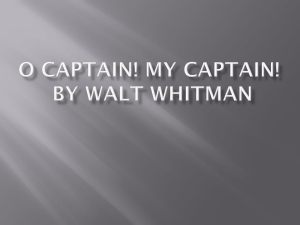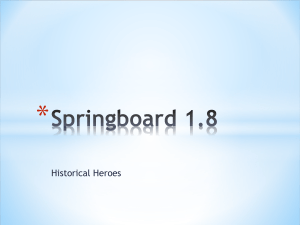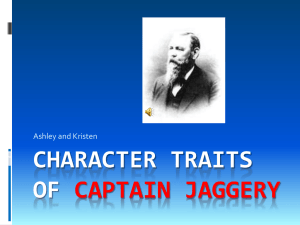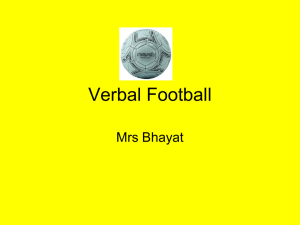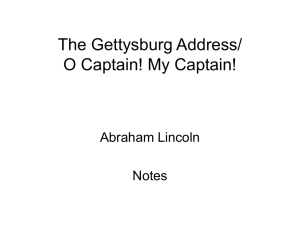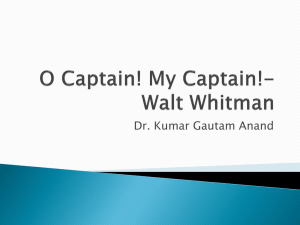O Captain! - Achieve the Core
advertisement
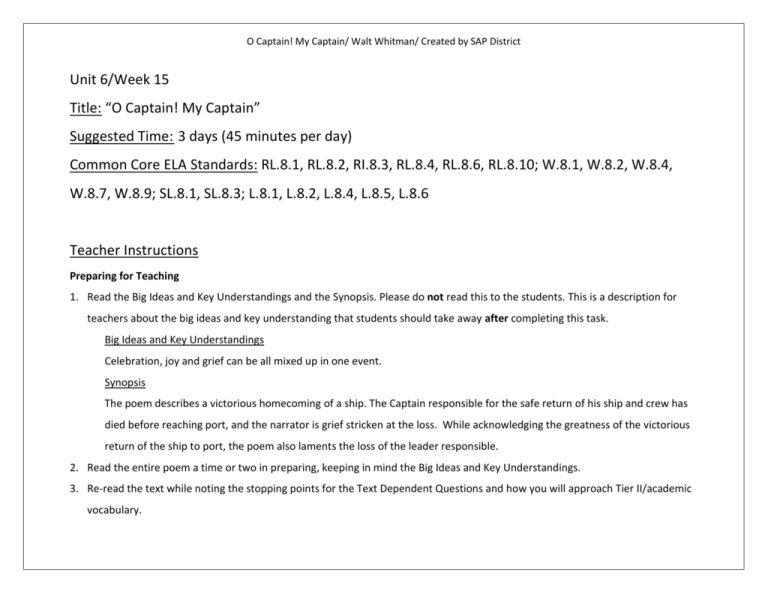
O Captain! My Captain/ Walt Whitman/ Created by SAP District Unit 6/Week 15 Title: “O Captain! My Captain” Suggested Time: 3 days (45 minutes per day) Common Core ELA Standards: RL.8.1, RL.8.2, RI.8.3, RL.8.4, RL.8.6, RL.8.10; W.8.1, W.8.2, W.8.4, W.8.7, W.8.9; SL.8.1, SL.8.3; L.8.1, L.8.2, L.8.4, L.8.5, L.8.6 Teacher Instructions Preparing for Teaching 1. Read the Big Ideas and Key Understandings and the Synopsis. Please do not read this to the students. This is a description for teachers about the big ideas and key understanding that students should take away after completing this task. Big Ideas and Key Understandings Celebration, joy and grief can be all mixed up in one event. Synopsis The poem describes a victorious homecoming of a ship. The Captain responsible for the safe return of his ship and crew has died before reaching port, and the narrator is grief stricken at the loss. While acknowledging the greatness of the victorious return of the ship to port, the poem also laments the loss of the leader responsible. 2. Read the entire poem a time or two in preparing, keeping in mind the Big Ideas and Key Understandings. 3. Re-read the text while noting the stopping points for the Text Dependent Questions and how you will approach Tier II/academic vocabulary. O Captain! My Captain/ Walt Whitman/ Created by SAP District During Teaching 1. Students first read the poem independently. 2. The teacher reads the text aloud while students follow along or students take turns reading aloud to each other. This is a short poem, so it is a great chance to practice oral reading for fluency and even for performance. 3. Students and teacher re-read the text while stopping to respond to and discuss the questions, continually returning to the text. A variety of methods can be used to structure the reading and discussion (i.e., whole class discussion, think-pair-share, independent written response, group work, etc.) 4. After the “O Captain! My Captain” poem is thoroughly analyzed, have students read this short article from Library of Congress: http://www.loc.gov/teachers/lyrical/poems/my_captain.html. There is a print button on the page. Then have students work alone or in groups to gather evidence from the article that they’ll use in their writing. There are a few guiding questions below the “O Captain” questions. Text Dependent Questions Text-dependent Questions: “O Captain! My Captain” How many lines are in the poem? Record your answer. How many sentences are in the poem? Evidence-based Answers Have students try to do this alone first; then compare notes with a partner, small group or the class. You might have some interesting discussions doing the sentence count! It’s easy to see there are 24 complete lines. But how many sentences? By this writer’s count: 7. But I counted “the arm beneath your head” which is a fragment, and didn’t count the appositives with! Teacher Note: There are fragments I didn’t count, semi-colons that could really be periods, and then 4 LONG sentences. O Captain! My Captain/ Walt Whitman/ Created by SAP District Read the first sentence (stanza one). What does exulting mean? Exulting means to celebrate with great energy or enthusiasm. I Who is exulting, and where are they? know this because they are also ringing bells and later in the poem it says they are crowded together waiting with wreaths and bouquets. The people standing at the port are exulting (their eyes are following the ship (line 4)), so they can’t be on it. They must be on the shore ringing the bells and celebrating. Who is the narrator of this poem? What is (his) mood in the The narrator is a crew member (my captain) and his mode goes first stanza? What evidence from the text supports your from celebratory to shock as he suddenly realizes the captain analysis and thinking? has died (O heart! heart! heart!). In the second stanza, one phrase is repeated 5 times. What is “For you” is repeated 5 times. The focus here is all on the it? Why do you think Whitman chose to repeat this phrase? Captain and the pleading of the narrator for the captain to What effect does it create? wake up and know the eagerness of the crowd. This effectively communicates the despair and the “hoping against hope” that the narrator is feeling. Does “the swaying mass” ever learn what the narrator has No. The last 4 short lines let us know the people on shore are known since the first stanza? How do you know? still celebrating and ringing bells while the narrator is walking “with mournful tread.” If you had to describe this poem’s mood(s) with two adjectives, Answers will vary, but celebratory and somber would be great what would they be? Explain. If you had to go down to just a answers, or excited and sad, etc. There should be sense of one word description of the overall mood, what one word contrast. The weight of the poem is clearly on the shock and would you pick? Why? sadness at the death of the beloved captain (“fallen cold and dead” ends every stanza). The narrator is given the most voice and gets the last word. The prevailing mood is grief. Astute students may also comment on how the pounding beat of the poem contributes to the heavy, sad mood. If no student talks about the rhythm, the teacher should read the poem aloud again and ask the students to attend to the strong rhythms and to decide if they think it is a light or a dark rhythm. Rewrite the last four lines in your own words. Compare your Answers will vary. You people on shore keep celebrating while paraphrase to others and discuss them. you can. Me, I’m going to stay here near my captain and quietly mourn his death. O Captain! My Captain/ Walt Whitman/ Created by SAP District Text-dependent Questions: Library of Congress Article Have students read the first three paragraphs of the short article about the when and why of Walt Whitman writing this poem (teachers may choose instead to read the essay aloud). Students will need this information and a copy of the essay for the writing assignment. What was ironic about the timing of when President Lincoln was assassinated? Why does the article say Whitman wrote “O Captain! My Captain!”? What evidence does the article provide that would allow the author to call America as a “shattered nation” in the third paragraph? Evidence-based Answers N/A The Civil War was over, so it seemed pointless. The nation was supposed to coming together and healing, not killing. Whitman was inspired by Lincoln and admired him greatly. He was upset by his death and that inspired him to write the poem. The first paragraph has references to a “war-weary nation plunged into shock” and that it had just come through four years of “conflict and instability.” Teacher: Note: students may know from studying the Civil War how many American lives it cost to keep the union intact and how divided the nation had been. This can help them make the inferences, but they should still provide the evidence from the essay itself! O Captain! My Captain/ Walt Whitman/ Created by SAP District Meaning needs to be provided Meaning can be learned from context Tier II/Academic Vocabulary These words require less time to learn These words require more time to learn (They are concrete or describe an object/event/ process/characteristic that is familiar to students) (They are abstract, have multiple meanings, are a part of a word family, or are likely to appear again in future texts) Page 748 – weathered Page 748 – sought Page 749 – victor Page 749 – tread Page 749 – will Page 749 – object Page 749 – mournful LoC article – plunged LoC article – embodied LoC article – coda LoC article – instability LoC article – virtues Page 748 – rack Page 748 – exulting LoC article – overshadowed LoC article – secure (for him) LoC article – cordial LoC article – evocation O Captain! My Captain/ Walt Whitman/ Created by SAP District Culminating Writing Task Prompt “O Captain! My Captain!” is about a real event and a real person in American history. Explain who the poem was written to honor and what event inspired Whitman to write it. Then track how the poem captured the feelings of a whole nation. More explanation: Now that you have studied and understood “O Captain! My Captain!” you are going to analyze it by using another piece of evidence. You are going to read about why Walt Whitman wrote the poem, and who he wrote it for. After reading the first three paragraphs of the article your teacher gave you, write a short essay that explains what the historical events were that were mirrored in “O Captain! My Captain!” Explain how the real life example of “triumph overshadowed by despair” as the Library of Congress article put it (paragraph 3) are represented in the poem. Teacher Instructions 1. Get the three paragraph ancillary text from the Library of Congress link. http://www.loc.gov/teachers/lyrical/poems/ my_captain.html. It is also reproduced for you on the last page of this packet. 2. Students identify their writing task from the prompt provided. Full class discussion will help the teacher know whether or not every student understands what they are expected to do. 3. Students complete an evidence chart as a pre-writing activity. Teachers should guide students in gathering and using any relevant notes they compiled while reading and answering the text-dependent questions earlier. Some students will need a good deal of help gathering this evidence, especially when this process is new and the text is challenging! Evidence Quote or paraphrase Page number Elaboration / explanation of how this evidence supports ideas or argument O Captain! My Captain/ Walt Whitman/ Created by SAP District First line: “O Captain! My Captain! Our fearful trip is done…the prize we sought is won “Lincoln’s death inspired Whitman to write one of his most memorable works – a simple three stanza poem…” p. 748, lines 1-2 Library of Congress essay ¶ 3 The last four lines: “Exult O shores and ring O bells!/But I with mournful tread/Walk the deck my Captain lies/fallen cold and dead”. “Fallen cold and dead” is repeated at the end of each verse. p. 749, v.3, lines 21-24 “The poem’s evocation of triumph overshadowed by despair spoke to readers throughout the shattered nation” Library of Congress essay ¶ 3 From fearful trip the victor ship comes in with object won p. 749, v.3 line 20 The poet is talking to the leader, the captain and telling him they are done. They have won the prize and are coming home. This explains that the poem was written to honor Lincoln and written because he died. Lincoln is the Captain and “the vessel grim and daring” is the United States coming through the war still in one piece. The country is celebrating because the war (the voyage) is over, just like the narrator was at first. They don’t know what the narrator already knows, that their captain (their “father”) is dead and can’t enjoy the victory with them. The narrator alone already knows and is sad, which somehow makes the whole poem seem even more tragic. This means the poem managed to mix together the sense of joy at winning the war (bringing the ship back to port safely) with the horror over President Lincoln (the Captain) being killed before he could celebrate and be honored for what he had done for the nation. The captain steered his ship in but then he died. 4. Once students have completed the evidence chart, they should look back at the writing prompt in order to remind themselves what kind of response they are writing (i.e. expository, analytical, argumentative) and think about the evidence they found. (Depending on the grade level, teachers may want to review students’ evidence charts in some way to ensure accuracy.) From here, students should develop a specific thesis statement. This could be done independently, with a partner, small group, or the entire class. Consider directing students to the following sites to learn more about O Captain! My Captain/ Walt Whitman/ Created by SAP District thesis statements: http://owl.english.purdue.edu/owl/resource/545/01/ OR http://www.indiana.edu/~wts/pamphlets/ thesis_statement.shtml. 5. Students compose a rough draft. With regard to grade level and student ability, teachers should decide how much scaffolding they will provide during this process (i.e. modeling, showing example pieces, sharing work as students go). 6. Students complete final draft. Sample Answer: “O Captain! My Captain!” refers to a terrible event in American history: the assassination of President Abraham Lincoln. The poet, Walt Whitman, points out that the murder of the president happened right when the country should have been able to celebrate and rejoice over the ending of the Civil War and the country being kept whole. “O Captain! My Captain!” doesn’t seem, at first, like it is about the end of the Civil War and the assassination of Abraham Lincoln. It is written as if a sailor on a ship is talking about spotting the home port and seeing all the people there ready to celebrate the ship’s homecoming and to honor the captain who brought the ship and crew safely back. It says in the first verse, “The ship has weathered every rack, the prize we sought is won” (line 2). Then in the second verse, the sailor says to his captain, “Rise up – for you the flag is flung – for you the bugle trills” (line 10). But the captain can’t rise up. He is on the deck “fallen cold and dead.” In fact, Whitman repeats that line, “fallen cold and dead,” at the end of each verse of this poem, three times. O Captain! My Captain/ Walt Whitman/ Created by SAP District There is something terrible about only the one sailor on the boat realizing that the Captain is dead and can’t enjoy the victory. It ruins the joy of coming home safely for the sailor, and you get the sense that as soon as the people on shore find out their captain is dead, they are going to grieve as much as him. The essay we read from the Library of Congress said that Walt Whitman was in Washington during the war and saw and admired Lincoln. So, the joy and then sorrow that the narrator felt in the poem must have been similar to the public’s feelings when Lincoln was killed. Everyone wanted to celebrate that the terrible war was over and the North had won, but it all turned horribly because the President, who had made it happen, was killed senselessly after the close of the war. Additional Tasks Read another poem by Whitman. The Elements of Literature includes “I Hear America Singing” next to “O Captain! My Captain!” or it is easy to find additional Whitman poems, if necessary. Compare the writing styles of the two poems: the rhyme scheme and the rhythm. What do you notice? How are they different? How do these differences impact the moods of the poems? Answer: “O Captain! My Captain!” is a simple poem with lots of internal rhyming and a heavy beat. Other Whitman poems are lighter and less predictable. They are usually written more freely. It is “O Captain! My Captain!” is unusual for Whitman. (Teacher Note: Students won’t know that, but they should notice the difference. It has a much heavier beat than many of his poems, and quite a bit more conventional rhyming and rhythm. This makes it easier to read and understand). This poem is considered an Elegy, which means it is written to express sorrow. Do you think it should be considered an Elegy? Use direct quotes from the text to support your analysis and reasoning. O Captain! My Captain/ Walt Whitman/ Created by SAP District Notes to Teacher If no student talks about the rhythm (though it may come up during discussion of the mood of the poem), the teacher should read the poem aloud again and ask the students to attend to the strong rhythms and to decide if they think they make a light or a dark rhythm. If you have time to do the research, extending the anthology selections with a paired informational text is a great way to include more informational reading in your curriculum. As with this brief essay, it does not need to take much more time, but it can add a good deal to your students’ fund of general knowledge and to their confidence as learners from text. The text from the Library of Congress Link is reproduced below. O Captain! My Captain/ Walt Whitman/ Created by SAP District Appendix Library of Congress Essay: Giving Context to “O Captain! My Captain!” – Walt Whitman and Abraham Lincoln’s Assassination When President Abraham Lincoln was assassinated on April 14, 1865, a war-weary nation was plunged into shock. The last great battles of the Civil War were still a recent memory, and the murder of the president seemed to be a bloody, pointless coda to four years of conflict and instability. There was a great outpouring of grief across the country, and poems and songs were written mourning the nation’s loss. One American who grieved for the fallen president was the poet Walt Whitman. Whitman had lived in Washington for most of the war and was a great admirer of Lincoln, whom he felt embodied the American virtues of plain-spokenness, courage, and "horse-sense." He often saw the president riding around town on horseback, and the two men sometimes exchanged cordial bows. Lincoln’s death inspired Whitman to write one of his most memorable works—a simple, three-stanza poem of sorrow that bore little resemblance to his other, more experimental writings. "O Captain! My Captain!" was published in New York’s Saturday Press in November of 1865, and was met with immediate acclaim. The poem’s evocation of triumph overshadowed by despair spoke to readers throughout the shattered nation, and it was widely reprinted and published in anthologies. "O Captain! My Captain!" became the most popular poem Whitman would ever write, and helped secure for him a position as one of the greatest American poets of the 19th century. O Captain! My Captain/ Walt Whitman/ Created by SAP District
